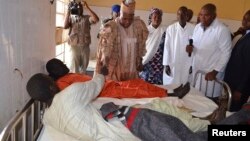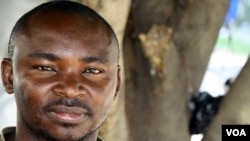ABUJA —
It has been a bloody seven days in northern Nigeria, where a pastor and a prominent sheik were murdered over the weekend, just days after scores of people were killed in separate attacks in Borno and Adamawa states. Militants are targeting clerics for speaking out against extremism, according to accounts by local residents.
Last week, after the Nigerian military announced it would quickly end Nigeria’s more than four-year-old insurgency, the bloodshed got worse. Militants stormed a town, bombed a church and bombed a bus.
Then, on Friday, a pastor was killed in Adamawa, one of three Nigerian states under emergency rule. Saturday night, Sheik Adam Albani’s car was fired on in Zaria, a city in Kaduna state where hideouts of Islamist militant group Boko Haram have been discovered. The attack killed the sheik, his wife and their child who was in her lap.
On a quiet street in the Nigerian capital, Godwin Adie, a real estate broker neighbors call “The Pastor,” says Albani was known for preaching against extremism in an area where extremists are likely to recruit.
“I think what you’ll discover is that among all these religious leaders, he’s one of them that preached peace," Adie said. "I think because he was an advocate of his preaching peace, that’s why they slaughtered him, and killed him and his family.”
Boko Haram militants are blamed for thousands of deaths in the past four and a half years in attacks on churches, mosques, schools, media houses, security forces and government institutions.
Khalid Aliyu Abubakar is the secretary-general of Jama'atu Nasril Islam, an Islamic umbrella organization in northern Nigeria. Speaking to VOA on his way to Zaria to attend the Sheik Albani's funeral and meet with other religious leaders, he notes that the murders have been blamed on Boko Haram, but no one has taken responsibility for the attacks.
“The greatest challenge now falls to the security agencies of this country to investigate, to dig out, to find out, and tell us," said Abubakar.
But, he adds, Albani was well known for being a strong advocate of education, a tense subject in northern Nigeria. Boko Haram means ‘Western education in sinful’ in the local Hausa language and militants have burned schools, killed students and threatened to kill all teachers.
In the past eight and half months, the Nigerian military has pushed insurgents out of many urban centers in the three states under emergency rule. But attacks continue in the countryside. Areas like Zaria, which is not under emergency rule, need more protection, Abubakar said.
“Security findings show some volatility, the erupting of violence or conflict, or murder.”
Others argue that peace talks are the only way to stop the killings.
On the Abuja street, Adie, the real estate broker, argues another commonly-held theory on how to end the violence. He says rich politicians and elites pay for the insurgency. If those funds are cut off, the impoverished young men and boys that do most of the fighting will all go home.
Last week, after the Nigerian military announced it would quickly end Nigeria’s more than four-year-old insurgency, the bloodshed got worse. Militants stormed a town, bombed a church and bombed a bus.
Then, on Friday, a pastor was killed in Adamawa, one of three Nigerian states under emergency rule. Saturday night, Sheik Adam Albani’s car was fired on in Zaria, a city in Kaduna state where hideouts of Islamist militant group Boko Haram have been discovered. The attack killed the sheik, his wife and their child who was in her lap.
On a quiet street in the Nigerian capital, Godwin Adie, a real estate broker neighbors call “The Pastor,” says Albani was known for preaching against extremism in an area where extremists are likely to recruit.
“I think what you’ll discover is that among all these religious leaders, he’s one of them that preached peace," Adie said. "I think because he was an advocate of his preaching peace, that’s why they slaughtered him, and killed him and his family.”
Boko Haram militants are blamed for thousands of deaths in the past four and a half years in attacks on churches, mosques, schools, media houses, security forces and government institutions.
Khalid Aliyu Abubakar is the secretary-general of Jama'atu Nasril Islam, an Islamic umbrella organization in northern Nigeria. Speaking to VOA on his way to Zaria to attend the Sheik Albani's funeral and meet with other religious leaders, he notes that the murders have been blamed on Boko Haram, but no one has taken responsibility for the attacks.
“The greatest challenge now falls to the security agencies of this country to investigate, to dig out, to find out, and tell us," said Abubakar.
But, he adds, Albani was well known for being a strong advocate of education, a tense subject in northern Nigeria. Boko Haram means ‘Western education in sinful’ in the local Hausa language and militants have burned schools, killed students and threatened to kill all teachers.
In the past eight and half months, the Nigerian military has pushed insurgents out of many urban centers in the three states under emergency rule. But attacks continue in the countryside. Areas like Zaria, which is not under emergency rule, need more protection, Abubakar said.
“Security findings show some volatility, the erupting of violence or conflict, or murder.”
Others argue that peace talks are the only way to stop the killings.
On the Abuja street, Adie, the real estate broker, argues another commonly-held theory on how to end the violence. He says rich politicians and elites pay for the insurgency. If those funds are cut off, the impoverished young men and boys that do most of the fighting will all go home.






